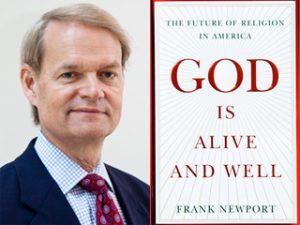Frank Newport is Editor in Chief at Gallup. Before joining Gallup, Newport taught sociology at the University of Missouri-St. Louis, was news director and talk show host at KTRH Radio in Houston, and was a partner at a market research and public opinion research firm in Houston. He is the co-author of two books and the author of Polling Matters: Why Leaders Must Listen to the Wisdom of the People (2004) and God is Alive and Well: The Future of Religion in America (2012). Newport is also a regular on radio via his weekly show, What Are We Thinking?, and as the featured analyst on Attitude Check, broadcast weekly on public radio’s Marketplace.
Book Basics
God is Alive and Well offers an unusually optimistic appraisal of the future of American religion based primarily on Gallup interview data from recent years. Newport, Editor in Chief at Gallup, argues that any attempt to characterize America as something other than a Christian nation is faulty approach since “80% of all Americans are Christians, and 95% of all Americans who have a religion are Christian” (p.21). While Christianity remains central, the religion is changing with current shifts offering many implications for the future including the possible end of the use of the term Protestant. Among Newport’s top reasons for optimism are (1) stability of religious belief and belonging in recent decades, (2) a health conscious culture that may be attracted to religion since studies show that religion is good for your health, and (3) an aging population that will lead to higher percentages of religion since those aged 60 or better have historically displayed higher levels of religion that younger age groupings. These reasons are supplemented by several others including (1) the unbranding of religion favoring less heirarchical forms, (2) shifts in the relationship of socio-economic status and politics with religion, and (3) favorable population projections including increases in the Hispanic population who tend to be more religious than most groups and population growth in states with religious cultures. While admitting the possibility he could be wrong, Newport asserts the future of American religion will be bright, look different that it does today, and remain primarily Christian.
So What?
Newport relies on solid data, but displays an obvious bias for religious optimism. Nones or the religiously non-affiliated serve as an excellent example. Nones, the fastest growing religion, receive inadequate attention. According to the latest Pew research, 1 in 5 Americans and 1 in 3 young adults in America (ages 18-29) have no religious affiliation. This change is in part about language, but also represents a significant cultural shift that appears to be as strong if not stronger than other factors (e.g., aging correlated with increased religiosity). What are the likely implications for the future of religion in a culture in which people are increasingly comfortable with and opting for religious non-affiliation? How might larger changes in dominant worldviews (e.g., a shift from modern to postmodern) impact the future of American religion? In what ways might unbranding and radical localization of Christian communities/congregations weaken the religious presence among elites who shape culture?
- Based on your knowledge of American religion over the last several decades, do you assume the future of American religion over the next few decades will be marked by stability, growth or decline? Explain.
- Which of Newport’s many reasons for optimism do you find most compelling? Why?
Frank Newport. God is Alive and Well: The Future of Religion in America (Gallup Press, 2012). ISBN: 9781595620620.
